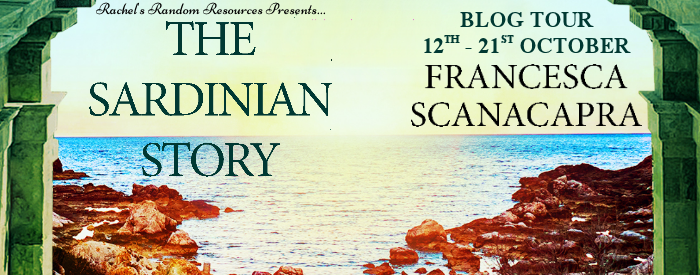Genre ~ Women’s Fiction
Publication date ~ September 28, 2023
I am delighted to share an extract with you today ~ thanks to Rachel’s Random Resources for organizing.
⤵ check out what my fellow bloggers thought of this one ⤵

Extract:
This extract is taken from the start of Chapter 2. Dante Bacchetti has welcomed into his home a stranger, Jubanne Melis Puddu, who has arrived out of nowhere telling Dante he has information about his long lost daughter. Dante has been convinced that Jubanne has something useful to tell him, and now Jubanne begins his story…
Jubanne Melis Puddu considered that life had dealt him a very favourable hand. He had many blessings to count, and he counted them often.
What man alive would not be grateful to have a wife as fine as his? Signora Melis Puddu was blessed with innumerable good qualities – kindness, intelligence, fortitude, to name but a few. Not only that, she was also strikingly beautiful, of unmistakably Mediterranean appearance, brown-eyed, dark-haired and olive-skinned.
Jubanne had been utterly taken with her from the moment they had met but had been shy about making his feelings known. Surely such an exceptional woman, one endowed with such elegance, class and sophistication, would not be interested in a great lumbering bear like him? Had she not made the first move, he might not have had the courage to mention that dance – but she had inquired whether he had any intention of asking her, and when he had mumbled ‘yes’ she had smiled and said, ‘I’ll consider myself invited, then.’. From that moment, he had never looked back. They’d got married only six months later. Everybody had been thrilled for them, saying what a good match they were.
There were those who couldn’t help but remark on the couple’s considerable difference in height. Jubanne didn’t mind if people mentioned the fifty centimetre disparity, but those who cracked off-colour jokes, or made any kind of innuendo, were immediately reprimanded. He was very proper when it came to things like that. This adherence to good manners had been instilled into him by his grandmother, the venerable Nonna Maria-Annoriana.
The Melis Puddus seldom argued. Both worked on the premise of being considerate
towards one another. There was nothing that Jubanne would not do to make his wife happy.
The fruit of this content and successful union was two children, a boy and a girl. That summer they were eight and ten years old respectively. Jubanne would gladly have had more children, but had agreed with his wife that a large family would be too much to deal with. They already had enough on their plates running the business.
Their guesthouse, Villa Zuannicca, had come from Signora Melis Puddu’s side of the family, but when she had inherited it, it had been a sorry place – out-dated and shabby, and lacking any sort of modern amenities or indoor plumbing. Over the years Jubanne and his wife had worked tirelessly to make something of it. Now Villa Zuannicca was a fine establishment, clean and well-appointed with three bathrooms on each of its three floors, plus separate WCs. There were fifteen guest rooms in total, each equipped to lodge between two and four people. The Melis Puddus served their guests good, wholesome food, and plenty of it – home-made pasta, traditional local fregola made from semolina, and fresh fish brought in daily off the boats, as well as the finest Sardinian lamb and suckling pig. The wine from the neighbouring vineyards flowed plentifully.
Every Friday night a band would come to entertain the guests and there would be dancing on the terrace. Sometimes, if she was not too busy and she felt that way inclined, Signora Melis Puddu would agree to sing, for aside from all her excellent qualities, she was blessed with a beautiful voice. Her repertoire comprised a wide range of traditional Sardinian folk tunes, and sometimes she took modern songs and gave them a folkish twist. The guests were always an appreciative audience. Jubanne would watch and listen, tapping his foot and swelling with pride – unless his wife sang ‘Amore Mio, Amore Mio’, before which she would say, ‘I dedicate this song to my husband,’ – in which case he would have to move discreetly to one side and pretend that he had something in his eye.
Book blurb:
Apennine Mountains, Italy, 1965
Leonora Bacchetti was once a happy child. But at the age of seventeen she has become a wild and rebellious young woman who leaves her parents in despair when she runs away from home with a group of itinerant travellers.
In the eyes of their friends and neighbours in the tight-knit village of Montacciolo, her parents’ good name is ruined.
At first, Leonora keeps in touch with her mother and father, sending letters and postcards from different countries until, very abruptly, her correspondence stops. The girl has vanished.
Vague, unreliable rumours of her fate abound, but newspaper appeals, police and private investigations reveal nothing.
Until, eighteen years later, in the midst of a snowstorm, a stranger from Sardinia knocks on the door of Leonora’s father’s little mountain house.
Now a widower, he has come to terms with never knowing what happened to his daughter. But everything changes when the unexpected visitor claims that he has new information.
The two men quickly bond and gradually begin to piece together the truth about Lenora, provoking deep questions about her life and how they have lived their own – questions about love, loyalty, honesty and what being a family really means.
The Sardinian Story is a novel of exquisite power and deep emotion which will live long in the memories of its readers.
Purchase Links
Author Bio –
Francesca Scanacapra was born in Italy to an English mother and Italian father, and her childhood was spent living between England and Italy. Her adult life has been somewhat nomadic with periods spent living in Italy, England, France, Senegal and Spain. She describes herself as ‘unconventional’ and has pursued an eclectic mixture of career paths – from working in translation, the fitness industry, education and even several years as a builder. In 2021 she returned to her native country and back to her earliest roots to pursue her writing career full time. Francesca now resides permanently in rural Lombardy in the house built by her great-grandfather which was the inspiration for her Paradiso Novels: Paradiso, Return to Paradiso and The Daughter of Paradiso. Her novel The Lost Boy of Bologna was also published by Silvertail Books.
Social Media Links –
Twitter https://twitter.com/FrancescaScana2
Insta @francescascana2
Thanks for stopping by! Visit my bookish product page here 🥰📚
Connect with me ⬇



